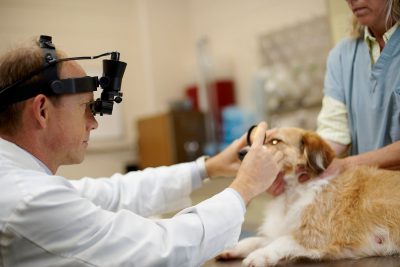
The Petersen-Jones Laboratory focuses on hereditary eye diseases in animals—primarily retinal degeneration phenotypes, and particularly the development of large animal models for retinal degeneration research. Current active studies include ocular melanosis, progressive retinal atrophy, cataracts in papillons, and comparative gene therapy.
Dr. Simon Petersen-Jones earned his vet degree at the Royal Veterinary College, University of London, UK in 1983. After 18 months in general practice, he returned to the Royal Veterinary College to complete a four-year residency in ophthalmology. He was awarded the Royal College of Veterinary Surgeons' specialist qualification in ophthalmology and then, in 1995, became a diplomate of the European College of Veterinary Ophthalmologists.
He was head of the Ophthalmology Service at University of Edinburgh, Scotland, from 1988 to 1994. Then from 1994–1998, he was a Wellcome Trust Veterinary Research Career Development Fellow at the University of Cambridge, UK, where he also taught the ophthalmology course. He was awarded a PhD for his research into hereditary retinal diseases in dogs. He has been on the faculty at Michigan State University since 1998.
Petersen-Jones has received awards for his contributions to veterinary science from the British Small Animal Veterinary Association and from Pfizer for his research achievements. He is co-editor of Small Animal Ophthalmology, the world's best-selling veterinary ophthalmology text, and the BSAVA "Manual of Small Animal Ophthalmology - A Problem Oriented Approach." He has written numerous book chapters and scientific articles on different aspects of veterinary ophthalmology and lectured in many countries around the world.
As a specialist clinical veterinary ophthalmologist with a PhD in molecular genetics, Petersen-Jones has long had an interest in hereditary eye disease in animals. During the past 20 years, he has concentrated predominantly on retinal degeneration phenotypes and in particular, development of large animal models for retinal degeneration research. Several forms of spontaneous inherited retinal degenerations exist in the pet dog and cat population.
